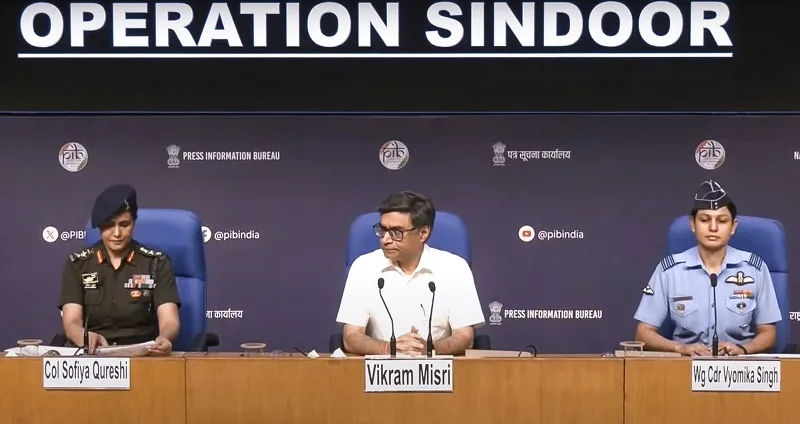New Delhi/Lahore: India’s armed forces destroyed nine “terrorist infrastructure” including that of Jaish-e-Mohammad and Lashkar-e-Taiba in Pakistan and Pakistan-occupied-Kashmir (PoK) in a 25-minute-long “measured and “non-escalatory” missile and drone strike early Wednesday in retaliation to the dastardly terror attack in Pahalgam.
Foreign Secretary Vikram Misri said India decided to carry out the “proportionate” strikes to bring the perpetrators and planners of the April 22 Pahalgam attack to justice as there was “no demonstrable step” from Pakistan to act against terrorist infrastructure on territories under its control.
Misri said India’s actions were in line with the UN Security Council’s statement about holding perpetrators, organisers, financiers and sponsors of the Pahalgam terror attack accountable.
“Under ‘Operation Sindoor’, the Indian military targeted Markaz Taiba of Lashkar-e-Taiba (LeT) in Muridke, Markaz Subhan Allah of Jaish-e-Mohammad (JeM) in Bahawalpur and Hizbul Mujahideen’s Mehmoona Joya Facility in Sialkot and LeT’s base in Markaz Ahle Hadith in Barnala and its camp in Muzaffarabad’s Shawai Nalla,” military officials said.
The operation was conducted from 1:05 am to 1:30 am and all the targets were neutralised with clinical efficiency, two women officers — Col Sophia Qureshi of the Army’s Corps of Signals and Wing Commander Vyomika Singh, a helicopter pilot of the IAF — said at a media briefing alongside Misri.
Around 15 minutes after the operation ended, the defence ministry said: “A little while ago, the Indian Armed forces launched ‘Operation Sindoor’ hitting terrorist infrastructure in Pakistan and Pakistan-occupied Jammu and Kashmir from where terrorist attacks against India have been planned and directed.”
It said the actions by the Indian Armed forces have been “focused, measured and non-escalatory in nature and that no Pakistani military facilities have been targeted”.
“India has demonstrated considerable restraint in selection of targets and method of execution,” the ministry said.
Military sources said Prime Minister Narendra Modi was monitoring ‘Operation Sindoor’ closely. Following the operation, he held a meeting of the Union Cabinet and hailed the Indian armed forces for successful strikes.
In his remarks, Misri said the Indian military carried out the “measured, non-escalatory, proportionate, and responsible” military strike to dismantle terrorist infrastructure to “deter and pre-empt” any further terrorist strikes.
Hours after the Indian operation, Pakistan Prime Minister Shehbaz Sharif said his country had every right to give a “befitting reply to this act of war imposed by India”. Pakistani Defence Minister Khawaja Asif, however, said Islamabad is ready to “wrap up” tensions with New Delhi, if it de-escalates the situation.
The Pakistan Foreign Ministry described the Indian strikes as “unprovoked” and that the Indian military has violated Pakistan’s sovereignty using standoff weapons.
The Pakistan army said at least 26 people were killed and 46 injured in these strikes.
JeM chief Maulana Masood Azhar acknowledged that 10 members of his family and four close associates were killed in India’s missile attack on the outfit’s headquarters in Bahawalpur.
Indian officials said the strikes on all nine targets including Bahawalpur and Muridke were successful.
Muridke, located a short distance from Lahore, is home to a sprawling “markaz” or base of Lashkar-e-Taiba (LeT). Bahawalpur is the main stronghold of the Jaish-e-Mohammed (JeM).
In Washington, US President Donald Trump said he hoped that the hostilities between India and Pakistan would end “very quickly”.
“It’s a shame, ” he said, adding “we just heard about it just as we were walking in the doors of the Oval (Office).”
“I just hope it ends very quickly,” he said when asked about the Indian actions on Pakistan.
National Security Advisor Ajit Doval spoke to US Secretary of State Marco Rubio and his counterparts in several countries including Saudi Arabia and the United Arab Emirates.
In his remarks, Misri said “Our intelligence monitoring of Pakistan-based terrorist modules indicated that further attacks against India were impending.”
“Earlier this morning as you would be aware India exercised its right to respond and pre-empt as well as deter more such cross-border attacks,” he said.
“These actions were measured, non-escalatory, proportionate, and responsible. They focused on dismantling the terrorist infrastructure and disabling terrorists likely to be sent across to India,” Misri said.
“The attack in Pahalgam was marked by extreme barbarity, with the victims mostly killed with headshots from close range and in front of their families,” he said.
It was the largest number of civilian casualties in a terrorist attack in India since the November 26, 2008 Mumbai terror attacks.
“Family members were deliberately traumatized through the manner of the killing, accompanied by the exhortation that they should take back the message,” Misri said.
Wing Commander Singh said Indian armed forces are fully prepared to respond to Pakistani “misadventure, if any, to escalate the situation”.
The women officers, providing an overview of the ‘Operation Sindoor’, said the strikes on the terror camps were undertaken through precision capability, using weapons with careful selection of warheads that ensured no collateral damage.
“The point of impact in each of the targets was a specific building or a group of buildings,” said Singh.
The briefing by Misri and the two women officers began with a video of several terror attacks including the 2001 Parliament attack, the 2008 Mumbai strikes and the 2019 Pulwama suicide bombing which were carried out by Pakistan-based terror groups.
The name for the action — Operation Sindoor ‘? is a reference to the red vermillion that married Hindu women wear to signify their married status.
In the Pahalgam attack, husbands of several women were killed in front of them, including an Indian Navy officer.
Meanwhile, Jaish-e-Mohammad (JeM) chief Maulana Masood Azhar acknowledged on Wednesday that 10 members of his family and four close associates were killed in India’s missile attack on the outfit’s headquarters in Bahawalpur.
A statement attributed to Azhar said those killed in the attack on Jamia Masjid Subhan Allah in Bahawalpur included the JeM chief’s elder sister and her husband, a nephew and his wife, another niece, and five children from his extended family.
The statement further mentioned that the attack also claimed the lives of one of Azhar’s close associates and his mother, along with two other close companions.
“This act of brutality has broken all boundaries. There should be no expectation of mercy now,” it added.
Bahawalpur became the hub of the JeM after the release of Azhar in exchange for the hijacked passengers of IC-814 in 1999.
In May 2019, the United Nations designated Azhar a “global terrorist” after China lifted its hold on a proposal to blacklist the JeM chief, a decade after New Delhi approached the world body for the first time on the issue.
The elusive Azhar, who has not been seen in public since April 2019, is believed to be hiding in a “safe place” in Bahawalpur.
The group has been involved in a series of terror attacks in India, including the Parliament attack in 2001, the strike on the Jammu and Kashmir assembly in 2000, the attack on the IAF base in Pathankot in 2016 and the Pulwama suicide bombing in 2019.
Meanwhile, Punjab Information Minister Azma Bokhari said that all those injured in the Bahawalpur attack have been shifted to Victoria Hospital and given the best treatment.
The Pakistan military said that 26 people were killed and 46 others injured in the attack.
PM Modi hails ‘Operation Sindoor’ at Cabinet meet
Prime Minister Narendra Modi on Wednesday hailed the Indian armed forces for carrying out “targeted strikes at terror camps” in Pakistan and Pakistan-occupied-Kashmir.
The prime minister chaired a meeting of the Union Cabinet, hours after ‘Operation Sindoor’ was launched to destroy terror targets in Pakistan and PoK.
Soon after Defence Minister Rajnath Singh informed the Cabinet about Operation Sindoor, the entire Cabinet hailed the action and the prime minister’s leadership with thumping of desks.
Modi is also learnt to have said that his government will have zero tolerance towards terror.
The prime minister also separately met the Defence Minister and NSA Ajit Doval and took stock of the evolving situation, sources said.
Retaliating against the Pahalgam terror attack, Indian armed forces early Wednesday carried out missile strikes on nine terror targets in Pakistan and PoK, “including the Jaish-e-Mohammad stronghold of Bahawalpur and Lashkar-e-Taiba’s base in Muridke”.
The prime minister had earlier given full operational freedom to the armed forces to decide on the targets, manner and timing of the action against terror in the wake of the Pahalgam attack in which 26 civilians were killed.
Union Home Minister Amit Shah said the ‘Operation Sindoor’ is Bharat’s response to the brutal killings of innocent people in Pahalgam.
The home minister said the Modi government is resolved to give a befitting response to any attack on India and its people and Bharat remains firmly committed to eradicating terrorism from its roots.
“Proud of our armed forces. #OperationSindoor is Bharat’s response to the brutal killing of our innocent brothers in Pahalgam,” he wrote on ‘X’.
Govt convenes all-party meet on Thursday
The government has convened an all-party meeting on Thursday to brief them about the strike carried out by the armed forces targeting terror targets in Pakistan and Pakistan-occupied-Kashmir.
Parliamentary Affairs Minister Kiren Riiiju posted on X about the proposed meeting.
“Govt has called an All Party leaders meeting at 11 am on 8th May, 2025 at Committee Room: G-074, in the Parliament Library Building, Parliament Complex in New Delhi,” he said.
The government on Wednesday said Indian military carried out a “measured, non-escalatory, proportionate, and responsible” strike to dismantle terrorist infrastructure in Pakistan to “deter and to pre-empt” any further terrorist strikes to retaliate the Pahalgam attack.
Operation Sindoor: World leaders call on India, Pak to exercise restraint; hope hostilities ‘end very quickly’
World leaders, including UN chief Antonio Guterres and US President Donald Trump, on Wednesday called on India and Pakistan to exercise restraint and hoped that the hostilities would end “very quickly”.
In retaliation against the Pahalgam terror attack, Indian armed forces early Wednesday carried out missile strikes on nine terror targets in Pakistan-occupied Kashmir (PoK) and Pakistan, including Bahawalpur, a stronghold of the Jaish-e-Mohammad (JeM) terror outfit.
UN Secretary-General Guterres called for “maximum military restraint” from India and Pakistan, saying the world cannot afford a military confrontation between the two countries.
“The Secretary-General is very concerned about the Indian military operations across the Line of Control and the international border. He calls for maximum military restraint from both countries. The world cannot afford a military confrontation between India and Pakistan,” the secretary-general’s spokesman, Stephane Dujarric, said.
US President Trump said he hopes that the hostilities will end “very quickly”.
“It’s a shame, ” he said, adding, “We heard about it just as we were walking in the doors of the Oval (Office). I guess people knew something was going to happen based on a little bit of the past.”
“They’ve been fighting for a long time. They’ve been fighting for many, many decades and centuries, actually, if you really think about it,” Trump said.
Asked if he has any message for the countries, he said, “No, I just hope it ends very quickly.”
US Secretary of State Marco Rubio said he was closely monitoring the situation between India and Pakistan.
Russia also expressed deep concern at the escalation of military confrontation between India and Pakistan in the wake of the Pahalgam terror attack.
“We are deeply concerned about the intensifying military confrontation between India and Pakistan after the terrorist attack near the city of Pahalgam,” Russia Foreign Ministry spokesperson Maria Zakharova was quoted as saying by state-run news agency TASS.
“We call on the parties involved to exercise restraint in order to prevent further deterioration of the situation in the region.
“We hope that the differences between New Delhi and Islamabad will be resolved through peaceful, political and diplomatic means on a bilateral basis in accordance with the provisions of the Simla Agreement of 1972 and the Lahore Declaration of 1999,” the spokesperson said in a statement in the wake of ‘Operation Sindoor’.
British Prime Minister Keir Starmer said the UK is engaging with both India and Pakistan to push for dialogue and de-escalation.
“Rising tensions between India and Pakistan will be of serious concern for many across Britain. We are engaging urgently with both countries, as well as other international partners, encouraging dialogue, de-escalation and the protection of civilians,” he told the House of Commons.
Foreign Secretary David Lammy said the tensions between India and Pakistan are a serious concern and urged the countries to “show restraint and engage in direct dialogue to find a swift, diplomatic path forward”.
“The UK has close and unique relationships with both countries. I have made clear to my counterparts in India and Pakistan that if this escalated further, nobody wins. The UK was clear in its condemnation of the horrific terrorist attack in Pahalgam last month. We need all sides to work urgently to see regional stability restored and ensure protection of civilians,” he said.
Business and Trade Secretary Jonathan Reynolds described the situation in Jammu and Kashmir as “hugely worrying”.
“Our message would be that we are a friend, a partner to both countries. We stand ready to support both countries. Both have a huge interest in regional stability, in dialogue, in de-escalation and anything we can do to support that, we are here and willing to do,” he said.
UK’s former prime minister Rishi Sunak said, “India is justified in striking terrorist infrastructure. There can be no impunity for terrorists.”
“No nation should have to accept terrorist attacks being launched against it from land controlled by another country,” he posted on X.
Scotland’s First Minister John Swinney took to social media soon after news of Operation Sindoor hit the headlines in the UK overnight.
“I am deeply concerned by the events in Kashmir tonight and urge calm and dialogue to avoid further conflict,” he said.
The German foreign ministry in a post on X said following the horrific terrorist attack in Kashmir and the Indian military response to it, responsible action from both countries is urgently needed.
“Escalation must be prevented and civilians protected. We are in contact with both India and Pakistan,” it said.
In an interview on TF1 television, French Foreign Minister Jean-Noel Barrot said, “We understand India’s desire to protect itself against the scourge of terrorism, but we obviously call on both India and Pakistan to exercise restraint to avoid escalation and, of course, to protect civilians.”
The United Arab Emirates asked India and Pakistan “to exercise restraint, de-escalate tensions, and avoid further escalation that could threaten regional and international peace,” according to a statement from UAE Deputy Prime Minister of Foreign Affairs Sheikh Abdullah bin Zayed Al Nahyan.
“His Highness stressed the importance of heeding the voices calling for dialogue and mutual understanding to prevent military escalation, strengthen stability in South Asia, and avoid further regional tensions,” the statement said.
“His Highness reaffirmed that diplomacy and dialogue remain the most effective means of peacefully resolving crises, and achieving the shared aspirations of nations for peace, stability, and prosperity.”
Bangladesh’s Ministry of Foreign Affairs said the government “is closely observing the evolving situation in India and Pakistan” and expresses its deep concern over the situation.
It urged both the countries to “remain calm, show restraint and refrain from taking any steps that could further aggravate the situation”.
The ministry said, “In the spirit of regional peace, prosperity and stability, Bangladesh remains hopeful that tensions will be defused through diplomatic endeavours, and that peace will ultimately prevail for the benefits of the peoples in the region.”
China called on India and Pakistan to exercise maximum restraint in the “larger interest of peace and stability” of the region and said it will play a “constructive role” in easing the tensions by working with the international community.
“We are concerned about the ongoing situation… India and Pakistan are and will always be each other’s neighbours. They are both China’s neighbours as well… We urge both sides to act in the larger interest of peace and stability, remain calm, exercise restraint and refrain from taking actions that may further complicate the situation,” China’s Foreign Ministry said in a statement.
Elaborating Beijing’s stand, Chinese Foreign Ministry spokesman Lin Jian said China “stands ready to work with the international community to continue to play a constructive role in easing the current tensions”.
Turkiye’s foreign ministry in a statement said it is following the developments between Pakistan and India with “concern”.
“We call on the parties to exercise common sense and refrain from unilateral actions. We expect that measures will be taken to reduce tensions in the region as soon as possible and that the necessary mechanisms, including in the field of counter-terrorism, will be put in place to prevent the recurrence of similar incidents,” it said.
Qatar’s Ministry of Foreign Affairs in a statement said it is following with deep concern the continued escalation between India and Pakistan, and urged both countries “to exercise maximum restraint, give priority to the voice of wisdom, respect the principles of good neighbourliness, and resolve the crisis through diplomatic means”.
The ministry emphasised the “urgent need” to keep communication channels open between India and Pakistan to defuse tensions and address unresolved issues between them through constructive dialogue, “ultimately leading to comprehensive, consensual, and sustainable solutions”. It also reiterates Qatar’s full support for all regional and international efforts aimed at promoting security, peace, and stability in the region.
Japan’s Chief Cabinet Secretary Yoshimasa Hayashi said the government is following the situation closely while reiterating its condemnation of the terrorist attack in Kashmir last month.
“We are strongly concerned that further retaliatory exchanges will escalate into a full-blown military conflict,” the top government spokesman said at a press conference.
“We strongly urge India and Pakistan to exercise restraint and stabilise the situation through dialogue for the peace and stability of South Asia,” Hayashi was quoted as saying by the Kyodo News.







